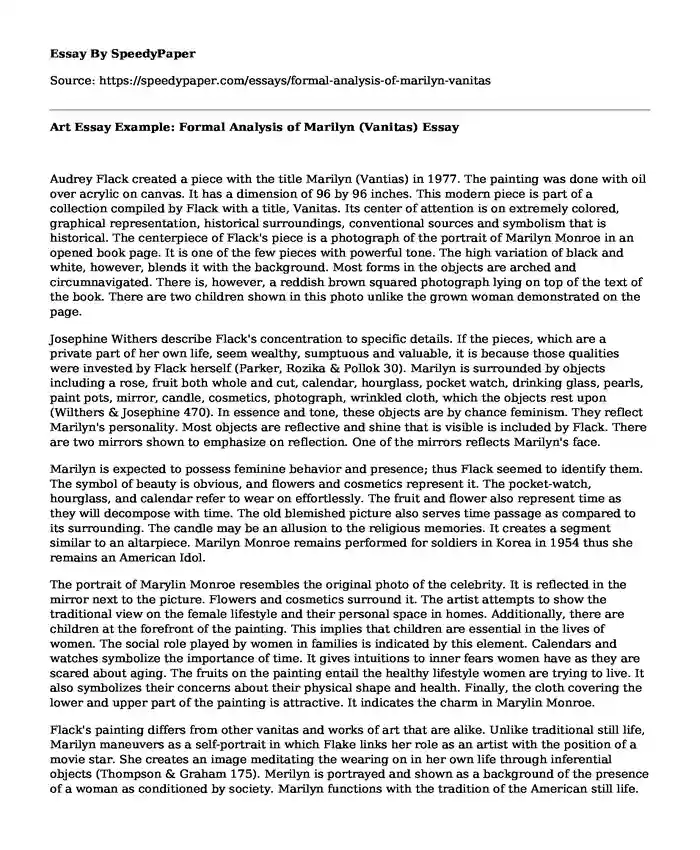Audrey Flack created a piece with the title Marilyn (Vantias) in 1977. The painting was done with oil over acrylic on canvas. It has a dimension of 96 by 96 inches. This modern piece is part of a collection compiled by Flack with a title, Vanitas. Its center of attention is on extremely colored, graphical representation, historical surroundings, conventional sources and symbolism that is historical. The centerpiece of Flack's piece is a photograph of the portrait of Marilyn Monroe in an opened book page. It is one of the few pieces with powerful tone. The high variation of black and white, however, blends it with the background. Most forms in the objects are arched and circumnavigated. There is, however, a reddish brown squared photograph lying on top of the text of the book. There are two children shown in this photo unlike the grown woman demonstrated on the page.
Josephine Withers describe Flack's concentration to specific details. If the pieces, which are a private part of her own life, seem wealthy, sumptuous and valuable, it is because those qualities were invested by Flack herself (Parker, Rozika & Pollok 30). Marilyn is surrounded by objects including a rose, fruit both whole and cut, calendar, hourglass, pocket watch, drinking glass, pearls, paint pots, mirror, candle, cosmetics, photograph, wrinkled cloth, which the objects rest upon (Wilthers & Josephine 470). In essence and tone, these objects are by chance feminism. They reflect Marilyn's personality. Most objects are reflective and shine that is visible is included by Flack. There are two mirrors shown to emphasize on reflection. One of the mirrors reflects Marilyn's face.
Marilyn is expected to possess feminine behavior and presence; thus Flack seemed to identify them. The symbol of beauty is obvious, and flowers and cosmetics represent it. The pocket-watch, hourglass, and calendar refer to wear on effortlessly. The fruit and flower also represent time as they will decompose with time. The old blemished picture also serves time passage as compared to its surrounding. The candle may be an allusion to the religious memories. It creates a segment similar to an altarpiece. Marilyn Monroe remains performed for soldiers in Korea in 1954 thus she remains an American Idol.
The portrait of Marylin Monroe resembles the original photo of the celebrity. It is reflected in the mirror next to the picture. Flowers and cosmetics surround it. The artist attempts to show the traditional view on the female lifestyle and their personal space in homes. Additionally, there are children at the forefront of the painting. This implies that children are essential in the lives of women. The social role played by women in families is indicated by this element. Calendars and watches symbolize the importance of time. It gives intuitions to inner fears women have as they are scared about aging. The fruits on the painting entail the healthy lifestyle women are trying to live. It also symbolizes their concerns about their physical shape and health. Finally, the cloth covering the lower and upper part of the painting is attractive. It indicates the charm in Marylin Monroe.
Flack's painting differs from other vanitas and works of art that are alike. Unlike traditional still life, Marilyn maneuvers as a self-portrait in which Flake links her role as an artist with the position of a movie star. She creates an image meditating the wearing on in her own life through inferential objects (Thompson & Graham 175). Merilyn is portrayed and shown as a background of the presence of a woman as conditioned by society. Marilyn functions with the tradition of the American still life. Ordinary items that have diviner descriptions create three-dimensional effects. The practicality of the artist's impression, however, helps onlookers to discern the actual message of the artist that women were forced to live in an environment that was created by men.
Flack recognizes the rich textures and colors of the physical world with her thickly packed picture of philosophy-provided objects. The painting portrays various objects that surround and accompany women in their regular life. The image of Monroe symbolizes the ideal female, according to the official social views. As a vanitas, Marilyn serves as a celebratory contemplation on the life, death, and celebrity of Marilyn Monroe. Both regular vanitas symbols, i.e. an hourglass and candle and modern ones, i.e. photograph and a calendar.
References
Parker, Rozsika, and Griselda Pollock. Old Mistresses: Women, art and ideology. IB Tauris, 2013.
Withers, Josephine. "All representation is political: Feminist art past and present." (2008): 456-475.
Thompson, Graham. American Culture in the 1980s. Edinburgh University Press, 2007.
Cite this page
Art Essay Example: Formal Analysis of Marilyn (Vanitas). (2022, Aug 26). Retrieved from https://speedypaper.net/essays/formal-analysis-of-marilyn-vanitas
Request Removal
If you are the original author of this essay and no longer wish to have it published on the SpeedyPaper website, please click below to request its removal:
- Leadership Research Essay Example
- Essay Example on Book Critique: Action Speaks by Paul Green
- Free Essay with a Discussion on Type 2 Diabetes in the United States
- Knowledge Measurement Essay Example
- Rhetorical Essay Sample on Martin Luther King, Jr.'s Letter
- Paper Example on Existential Psychology and Logotherapy
- Essay Example: Group Processes and Stage Formation
Popular categories





